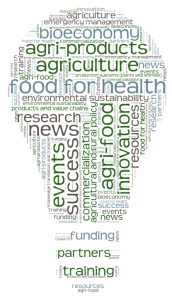Canadian Food and Beverage Manufacturers investing locally, supporting healthy & sustainable food systems globally (Newswire Canada)
Provision Coalition, Canada’s food and beverage manufacturer sustainability organization, has released a series of resources making sustainability solutions simple and accessible for food and beverage manufacturers across Canada. “At Provision Coalition, we have developed a number of tools that are supporting manufacturers in taking a strategic sustainability approach to their operations. For instance, tools that assist with manufacturer food waste are having economic, environmental and even social benefits,” said Cher Mereweather, Executive Director, Provision Coalition. Read more…..
The Food Chain (TVO)
Ontario’s public television—TVO—has a new(ish) current affairs program on all things food. The Food Chain runs Mondays at 9 pm on tv, supplemented by articles and weekly summaries posted online. Recent interesting stories include the wild food bank and the low-gluten communion wafer. Keep your eyes on this page for an upcoming story on prison farms. Read more…
And Speaking of Prison Farms…(CBC)
Long-time supporters of a federal prison farm program in Kingston, Ont., are looking to re-establish it five years after the Harper government shut it down. The Pen Farm Herd Co-Op, which acquired some of the cows from the former prison farm, said it has a commitment from the new Trudeau government to reopen the operation at Collins Bay penitentiary in Kingston. The co-op said it has developed a business plan that has already received preliminary approval from the Liberals. Read more…
Restorative Justice Organization wins Community Resilience and Food Security Funding (CFICE)
L.I.N.C. (Long-term Inmates Now in the Community) is a non-profit charity that works to develop positive understanding and dialogue between prison institutions, long-term offenders and the community. Emma’s Acres produces vegetables, herbs and fruit grown naturally on an eight-acre property leased to them by the District of Mission. “We figure we will be self-sustaining in two years, not this summer but next summer. So the money will allow us to do needed improvements to the infrastructure and buildings there”. Read more…
Pulses could be the foundation of a new food era (Globe & Mail)
A new year is soon upon us and the United Nations Food and Agriculture Organization has declared that 2016 will be the International Year of Pulses. The idea is to position pulses as a primary source of protein and other essential nutrients. Given the science behind pulses, and the challenges animal-protein production faces, it is appropriate that the FAO is showcasing the virtues of such a fascinating crop.
Pulses mean little to many people, but we all know about dried peas, edible beans, lentils and chickpeas. All of these products are common varieties of pulses. Pulses are known to have high protein and fibre content, and are low in fat. Sounds like the perfect food, doesn’t it? Indeed, pulses are often referred to as a “super food”. Read more…
Fresh Connections: The pilot season of a rural food hub (U Minn)
(Report Dec 2015 – 1.4 MB)
The diversity of perspectives that advisory committee members brought to the table ensured that decisions were examined from the different lenses of business, community health, and community development. The targeted expertise of the advisory committee’s grower and buyer members was also critical in the process, because it kept decisions rooted in stakeholder needs. In addition, the advisory committee kept planning firmly grounded in reality by challenging assumptions. Read more…
Sustainable Pathways: Natural Capital Accounting (FAO)
Natural capital is the foundation of economies. Businesses, and agriculture in particular, depend on natural capital to be viable. However, in the current business model, natural capital has been largely neglected; it is ‘economically invisible’. As a result, we are witnessing the over-exploitation of our finite natural capital through climate change, soil erosion, water pollution and loss of biodiversity and wild habitats such as forests and wetlands. The degradation of natural capital imposes external costs on society and future generations. These costs can be better understood and addressed by accounting for natural capital. Read more…
Natural Capital Impacts in Agriculture: Supporting Better Business Decision-making (FAO Report 2015)
This study provides stakeholders with an indication of the true magnitude of the economic and natural capital costs associated with commodity production, and present a framework that can be used to measure the net environmental benefits associated with different agricultural management practices. … To achieve this objective, Trucost has worked with FAO on two different types of analysis, utilising both Trucost data and models, as well as FAO data, to deliver:
- A global, commodity-based “materiality” approach to assess the natural capital impacts caused by the production of four crops – maize, rice, soybean and wheat – and four livestock commodities – beef (from cattle), milk (from cattle), pork and poultry.
- A set of four case studies focusing on different agri-commodities, exploring the trade-offs that exist between adopting different farming practices.



 This new COOL market is built on a new open source platform called “
This new COOL market is built on a new open source platform called “